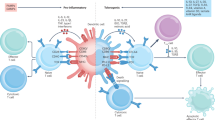Abstract
A major goal in immunology has been to find a means of selectively abolishing an individual's potential to mount an immune response to certain antigens, while preserving responsiveness to others. The facility to induce such specific immunological unresponsiveness in an adult would have major implications for tissue-grafting, the control of allergy and for treatment of autoimmune disease. Classical work has shown that immunosuppressive regimes, such as irradiation, anti-lymphocyte globulin or thoracic duct drainage, may facilitate tolerance induction1,2. We describe here a technique by which the immune system of mice can be manipulated to be tolerant to certain protein antigens by administering these during a brief pulse of treatment with a monoclonal antibody directed to the L3T4 molecule on helper T lymphocytes. This technique has the potential to form the basis of a novel generalized means of tolerance induction.
This is a preview of subscription content, access via your institution
Access options
Subscribe to this journal
Receive 51 print issues and online access
$199.00 per year
only $3.90 per issue
Buy this article
- Purchase on Springer Link
- Instant access to full article PDF
Prices may be subject to local taxes which are calculated during checkout
Similar content being viewed by others
References
Weigle, W. O. Adv. immun. 16, 61–121 (1973).
Shellam, G. R. Immunology 17, 267–270 (1969).
Cobbold, S. P., Jayasuriya, A., Nash, A., Prospero, T. D. & Waldmann, H. Nature 312, 548–551 (1984).
Dialynas, D. P. et al. J. Immun. 131, 2445–2451 (1983).
Dialynas, D. P. et al. Immun. Rev. 47, 29–56 (1983).
Wofsy, D. C., Mayes, J., Woodcock, J. & Seaman, W. E. J. Immun. 135, 1698–1701 (1985).
Cobbold, S. P. & Waldmann, H. Transplantation (in the press).
Wofsy, D. & Seaman, W. E. J. exp. Med. 161, 378–391 (1985).
Cobbold, S. P., Martin, G., Lovat, P. E. & Waldmann, H. Adv. exp. Med. Biol. 186, 789–795 (1985).
Waldmann, H. et al. Adv. exp. Med. Biol. 186, 869–875 (1985).
Ritz, J. & Schlossman, S. F. Blood 59, 1–11 (1982).
Reinherz, E. & Schlossman, S. F. Cell 19, 821–826 (1980).
Waldor, M. K. et al. Science 227, 415–417 (1985).
Ranges, G. E., Sriram, S. & Cooper, S. M. J. exp. Med. 162, 1105–1110 (1985).
Brostoff, S. W. & Mason, D. W. J. Immun. 133, 1938–1942 (1985).
Bindon, C., Hale, G., Clark, M. & Waldmann, H. Transplantation 40, 538–543 (1985).
Hale, G., Clark, M. & Waldmann, H. J. immun. 134, 3056–3060 (1985).
Lanier, L. L., Gutman, G. A., Lewis, D. E., Griswold, S. T. & Warner, N. L. Hybridoma 1, 125–130 (1982).
Author information
Authors and Affiliations
Rights and permissions
About this article
Cite this article
Benjamin, R., Waldmann, H. Induction of tolerance by monoclonal antibody therapy. Nature 320, 449–451 (1986). https://doi.org/10.1038/320449a0
Received:
Accepted:
Issue Date:
DOI: https://doi.org/10.1038/320449a0
This article is cited by
-
Apoptotic cell-linked immunoregulation: implications for promoting immune tolerance in transplantation
Cell & Bioscience (2015)
-
Successful attenuation of humoral immunity to viral capsid and transgenic protein following AAV-mediated gene transfer with a non-depleting CD4 antibody and cyclosporine
Gene Therapy (2012)
-
The battle against immunopathology: infectious tolerance mediated by regulatory T cells
Cellular and Molecular Life Sciences (2012)
-
Tolerance: an overview and perspectives
Nature Reviews Nephrology (2010)
-
Protective versus pathogenic anti-CD4 immunity: insights from the study of natural resistance to HIV infection
Journal of Translational Medicine (2009)
Comments
By submitting a comment you agree to abide by our Terms and Community Guidelines. If you find something abusive or that does not comply with our terms or guidelines please flag it as inappropriate.


